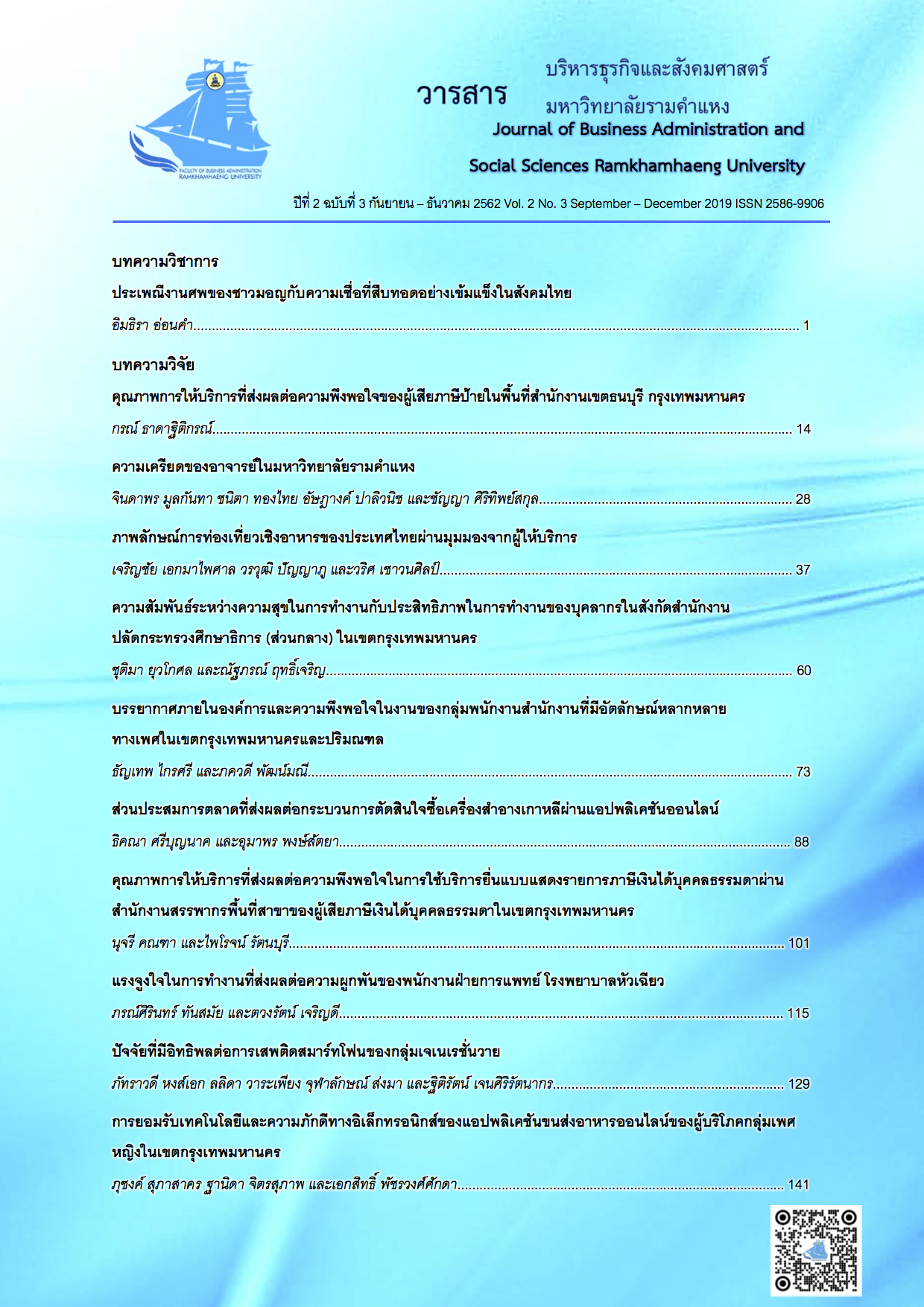Technology Acceptance and Customer e-Loyalty of Online Food Delivery Application of Female Consumers in Bangkok Metropolis
Main Article Content
Abstract
In this research investigation, the researchers compare (1) e-loyalty of food delivery applications in accordance with the differences of demographic factors of female consumers in Bangkok Metropolis. The researchers also examine (2) the influence of technology acceptance of online food delivery applications on consumer e-loyalty of these female consumers. The sample population consisted of 400 female consumers in Bangkok Metropolis. Data were collected using a questionnaire and analyzed using percentage, mean, and standard deviation. The techniques of one-way analysis of variance (ANOVA) and multiple regression analysis were also employed.
Findings showed that differences in monthly income exhibited differences in e-loyalty. The technology acceptance of applications influenced e-loyalty of the female consumers under study. The aspect of actual use affected e-loyalty at the highest level. Next in descending order were the aspects of intention to use, perceived risk, and perceived usefulness.
Article Details
เนื้อหาและข้อมูลในบทความที่ลงตีพิมพ์ในวารสารบริหารธุรกิจและสังคมศาสตร์ มหาวิทยาลัยรามคำแหง ถือเป็นข้อคิดเห็นและความรับผิดชอบของผู้เขียนบทความโดยตรง ซึ่งกองบรรณาธิการไม่จำเป็นต้องเห็นด้วย หรือร่วมรับผิดชอบใดๆ
บทความ ข้อมูล เนื้อหา รูปภาพ ฯลฯ ที่ได้รับการตีพิมพ์ในวารสารบริหารธุรกิจและสังคมศาสตร์ มหาวิทยาลัยรามคำแหง ถือเป็นลิขสิทธิ์ของวารสารบริหารธุรกิจและสังคมศาสตร์ มหาวิทยาลัยรามคำแหง หากบุคคลหรือหน่วยงานใดต้องการนำบทความทั้งหมดหรือส่วนหนึ่งส่วนใดไปเผยแพร่ต่อ หรือเพื่อกระทำการใดๆ จะต้องได้รับอนุญาตเป็นลายลักษณ์อักษรจากวารสารบริหารธุรกิจและสังคมศาสตร์ มหาวิทยาลัยรามคำแหง ก่อนเท่านั้น
References
กรมการปกครอง, ระบบสถิติทางการทะเบียน. (2561). สถิติจำนวนประชากรและบ้าน – จำนวนประชากรแยกรายอายุ. สืบค้นเมื่อ 14 กรกฎาคม 2562, จาก http://stat.dopa.go.th/stat/statnew/ upstat_age.php
กรุงเทพธุรกิจ. (2561). She-economy เมื่อเศรษฐกิจเอเชียถูกขับเคลื่อนด้วยผู้หญิง. สืบค้นเมื่อวันที่ 4 ธันวาคม 2562, จาก https://www.bangkokbiznews.com/pr/detail/49689
เกวรินทร์ ละเอียดดีนันท์. (2557). การยอมรับเทคโนโลยีและพฤติกรรมผู้บริโภคออนไลน์ที่มีผลต่อการตัดสินใจซื้อหนังสืออิเล็กทรอนิกส์ของผู้บริโภคในเขต กรุงเทพมหานคร. การค้นคว้าอิสระบริหารธุรกิจมหาบัณฑิต, มหาวิทยาลัยกรุงเทพ.
จิรภา รุ่งเรืองศักดิ์. (2557). การศึกษาการยอมรับและการรับรู้ความเสี่ยงที่ส่งผลต่อความไว้วางใจใน การใช้บริการระบุตำแหน่ง (Location-based Services: LBS) ของผู้ใช้บริการในเขตกรุงเทพมหานคร. การค้นคว้าอิสระบริหารธุรกิจมหาบัณฑิต, มหาวิทยาลัยกรุงเทพ.
ณัฏฐนันท์ พิธิวัตโชติกุล. (2558). การยอมรับเทคโนโลยีโทรศัพท์มือถือ การตลาดผ่านสื่อสังคม ออนไลน์ และพฤติกรรมผู้บริโภคออนไลน์ที่ส่งผลต่อความตั้งใจซื้อสินค้าออนไลน์ผ่านแอปพลิเคชันของผู้บริโภคในกรุงเทพมหานคร. การค้นคว้าอิสระบริหารธุรกิจมหาบัณฑิต, มหาวิทยาลัยกรุงเทพ.
ประอรพิชญ คัจฉวัฒนา. (2562). ‘She-Economy’ พลิกโลก เมื่อพลังหญิงขับเคลื่อนโลกเศรษฐกิจ & สังคมไร้เงินสด. สืบค้นเมื่อวันที่ 6 ธันวาคม 2562 จาก https://www.salika.co/2019/03/10/she-economy-change-world/
ภาวิณี กาญจนาภา. (2559). พฤติกรรมผู้บริโภค. กรุงเทพฯ: สำนักพิมพ์มหาวิทยาลัยศิลปากร.
Cantallops, A. S. & Salvi, F. (2014). New consumer behavior: A review of research on eWOM and hotels. International Journal of Hospitality Management, 36, 41-51.
Chu, A. Z. C. & Chu, R. J. C. (2011). The intranet’s role in newcomer socialization in hotel industry in Taiwan-technology acceptance model analysis. The International Journal of Human Resource Management, 22(5), 1163-1179.
Cox, D. F. & Rich, S. U. (1964). Perceived risk and consumer decision-making: The case of telephone shopping. Journal of Marketing Research, 1(4), 32-39.
Gray, B. & Kish-Gephart, J. J. (2013). Encountering social class differences at work: How “Class Work” perpetuates inequality. Academy of Management Review, 38(4), 670–699.
Kim, T. T., Kim, W. G., & Kim, H. B. (2009). The effects of perceived justice on recovery satisfaction, trust, word-of-mouth, and revisit intention in upscale hotels. Tourism Management, 30(1), 51-62.
Lien, C. H. & Cao, Y. (2014). Examining wechat users’ motivations, trust, attitudes, and positive word-of-mouth: Evidence from China. Computer in Human Behavior, 41, 104-111.
Liu, C. H. S. & Lee, T. (2016). Service quality and price perception of service: Influence on word-of-mouth and revisit intention. Journal of Air Transport Management, 52, 42-54.
Mowen, J. C. & Minor, M. (1998). Consumer Behavior (5th ed.). NJ: Prentice-Hall.
Oliver, R. L. (2014). Satisfaction: A Behavioral Perspective on the Consumer: (2nd ed.). New York: Routledge.
Srinivasan, S. S., Anderson, R., & Ponnavolu, K. (2002). Customer loyalty in e-commerce: An exploration of its antecedents and consequences. Journal of Retailing, 78(1), 41-50.
Thorndike, E. L. (1927). The law of effect. The American Journal of Psychology, 39(1/4), 212-222.
West, L. (2014). On the Rise and Online. Retrieved December 6, 2019, from http://perspectives.eiu.com/marketing/rise-and-online
Yamane, T. (1973). Statistics: An Introductory Analysis. New York: Harper & Row.


